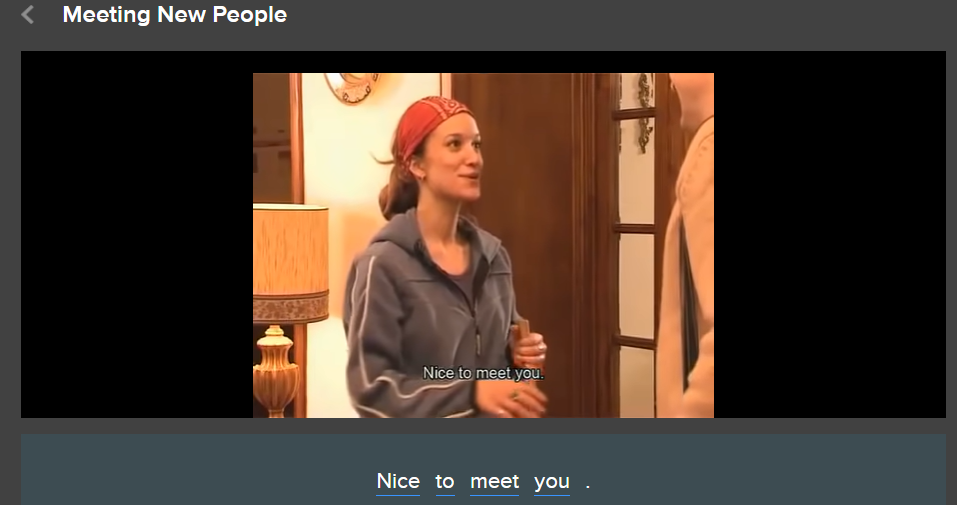Learn English With Funny Conversations Pdf

English Conversation for Beginners: 45+ Phrases and 10 Videos for Your English Speaking Adventure
Did you know that English conversation can take you on a fun adventure?
Conversing (talking) with others in English opens up a whole new world of opportunities.
I've put together a friendly guide to English conversation for beginners filled with useful, basic phrases—from greetings and small talk to saying goodbye—that'll take you on your first conversation adventure.
Contents
- Starting an English Conversation
-
- Informal greetings
- Formal greetings
- Introductions
- Making Small Talk in English
- Asking and Answering Questions
- Asking for Clarification
- Bringing an English Conversation to a Close
- Using Small Talk to End a Conversation
- Saying Goodbye in English
- 10 Tips for Getting English Conversation Practice
-
- 1. Try shadowing.
- 2. Practice with Authentic Media Using FluentU.
- 3. Talk to yourself.
- 4. Describe what you see.
- 5. Listen to and watch English media.
- 6. Use conversation apps.
- 7. Try tongue twisters.
- 8. Read out loud.
- 9. Find a language partner or a speaking tutor.
- 10. Take an online speaking course.
Download: This blog post is available as a convenient and portable PDF that you can take anywhere. Click here to get a copy. (Download)
Starting an English Conversation
If you need a push to start having conversations in English, watch the clip below for motivation:
Any polite conversation starts with a greeting (saying hello).
There are many ways to greet someone, and your choice will depend on who you're talking to.
It may be an informal conversation with a friend or an acquaintance (someone you know, but not very well).
Or you may use a more formal dialogue when having an English conversation with a colleague, a teacher, a stranger or a government employee.
In fact, getting comfortable speaking with strangers is a great way to boost your speaking skills and confidence level in English.
However, it's important to note that there are a few different ways in which English speakers will spark up a conversation(start a conversation) with a stranger.
Start with the video below to learn the different ways to speak with a stranger. You'll be chatting with them in no time (very soon) without any problem:
And now let's get this conversation started.
Informal greetings
Let's start with informal greetings. Here's how you can say hello:
- Hello!
(A universal greeting that works for every conversation.)
- Hi!
(A neutral and friendly greeting.)
- Hey!
(An informal and relaxed greeting.)
- Greetings!
(This is quite formal and rare these days, but could be used humorously among friends.)
- Howdy!
(A casual greeting that's not commonly used, but can add some flavor to your English.)
Formal greetings
For a more formal way to greet someone, use the model "good + [time of day]":
- Good morning!
(Reserved for any time before noon.)
- Good afternoon!
(Typically used between noon and 5-6 p.m.)
- Good evening!
(Any time after 6 p.m.)
Remember that "good night" normally means that you're saying goodbye. It's also commonly used right before going to bed.
Introductions
What if you've never met the person you're talking to before? Then, after greeting them, it'd be polite to introduce yourself and ask for their name.
You can learn how to do this in this video, where you'll learn that the easiest way to introduce yourself is to give your name:
- My name is _____. What's your name?
(This is simple, neutral and always works well!)
If you met somebody once before, but you don't remember their name, you can say this:
- I'm sorry, I don't remember your name. You are…?
(This is a bit more informal.)
If you want to introduce a person to someone else, you can simply say:
- Please meet + [name]
Please meet my friend Tom!
(Formal introduction.)
- This is + [name]
This is Tom!
(Common introduction.)
Now that you've introduced yourself, use one of the phrases below to respond to someone's introduction:
- Nice to meet you!
(The most common.)
- Pleased to meet you!
(Simple and polite.) - It's a pleasure!
(Informal, but nice.)
Making Small Talk in English
Great job! You're already having a conversation in English!
After you've exchanged names and greeted each other, you may go on to make some "small talk," like the one included in this entertaining video.
Small talk is common in many English-speaking countries, especially in the U.S., Canada and England.
It's considered polite to add small talk to the beginning of the conversation before talking about its main subject, whether it's personal or professional.
The most widespread (common) question is "How are you?" In fact, it's so common that it becomes automatic for people to say, even when they hardly know the person!
"How are you" is often even considered part of the greeting (i.e. "Hi, how are you?"). That's how necessary it's become!
There are several ways to ask someone how they're doing:
- How are you? / How are you doing?
(Neutral.)
- How's it going?
(More informal.)
- How are things?
(Informal.)
- What's up?
(Very informal.)
An interesting thing about asking these questions is that an answer isn't really required.
Unless you're very close friends with someone, they're not expecting you to give them an honest answer about your day—as this funny video shows:
Instead, a simple answer and a "how are you" in return is enough for a typical conversation in English:
- I'm well. How are you?
- It's going well, thank you. How are you doing?
- Fine, thanks. And yourself?
Note that you might often hear people say "I'm good" when they mean that they're well and doing well.
"I'm good" is grammatically incorrect in this context, but it's very common in spoken English, just like a few other mistakes English speakers make, so be careful!
Small talk can also be the primary goal of a conversation, especially when you're talking to people you don't know and are unlikely to meet again.
There are many ways to use small talk successfully, even when you're still getting comfortable with English conversation for beginners. Use them smartly!
Asking and Answering Questions
A conversation is an exchange of ideas, questions and thoughts, so the best way to keep a conversation going is to ask questions!
There are two types of questions you may ask: closed-ended and open-ended questions.
Closed-ended questions are also called "yes/no" questions, because their goal is to confirm or deny certain information. For example:
- Are you having a good day?
- Did you just get to the office?
- Have you seen my email?
Compare the examples above to the open-ended questions below. They'll ask a person to elaborate—i.e., to give more information instead of simply saying "yes" or "no."
- How is your day going?
(A perfect example of small talk!)
- When did you arrive at the office?
- What do you think about that email I sent?
Open-ended questions typically begin with "who," "what," "where," "when" and "why." They're important to make your English conversation informative and productive. See more examples here.
When the person you're talking to is asking you a question, listen to the keywords and pay attention to the verb being used. This will help you construct your answer using proper grammar.
Don't worry about using difficult words—it's fine to keep things simple! And if you don't understand a certain question or word, don't be afraid to ask.
As a beginner English learner, you may have trouble understanding everything being said in English. That's okay. You're still learning!
Asking for Clarification
You're getting good at conversations in English, but suddenly you realize (understand, see) that you're lost.
Maybe the other person is speaking too fast. Maybe they have an unfamiliar accent. Maybe you didn't hear the last thing they said. Or maybe they have a pen in their mouth and you can't understand what they're saying.
It's perfectly normal to ask for clarification or to repeat something. Just remember to be polite!
If you don't understand something, for example, a word or even some idea relating to your conversation, you could say:
- I'm sorry, I don't understand. Could you please repeat that?
- I'm sorry, I don't understand. Could you please explain that?
or even…
- Care to elaborate?
(This very informal question is the short version of "Do you care to elaborate on this?")
If you simply didn't hear something, just say it like this:
- I'm sorry, I didn't hear that. Could you please repeat?
- I'm sorry, I didn't catch that. Could you please repeat?
or even…
- Could you say that again, please?
- Come again?
(This is very informal, and it can sound rude to some people.)
Don't be shy to ask for help. People are generally very happy to explain or repeat something!
And please, don't forget to thank them after they do.
Bringing an English Conversation to a Close
Say you've got all the information you need from the person. It's time for you to go.
Maybe you're running late and want to keep the conversation brief. No matter the reason, it's always nice to let the person know you can't continue talking to them for much longer.
There are many ways to do it depending on the situation. For example, if you're late, say:
- I have to get going. / It's time for me to go.
(This is polite and neutral.)
- I have to run—can we continue later?
(This is more informal, but also polite.)
And if you have all the information you wanted:
- Thank you so much for your help!
(A very common and useful expression.)
- Got it, thanks!
(Very informal and friendly.)
- I think I have everything I need, thank you!
(This is formal and may come across as rude if you don't thank the person after, so use it with caution.)
Using Small Talk to End a Conversation
Hey, guess what? Small talk can be used at the end of an English conversation too!
Before saying goodbye, it's polite to say something like:
- Have a good day!
(This works in any situation.)
- Enjoy your day!
(This one's a bit more formal.)
- Good luck!
(If the person needs it; it'll depend on the situation.)
- Talk to you soon!
(This is neutral and doesn't necessarily mean that you'll really talk to the person soon.)
- Great seeing you / Great talking to you!
(This is informal yet common.)
- Catch you later!
(This is very informal and fun.)
And after that, the only thing left to do is…
Saying Goodbye in English
This one's easy. You really can't go wrong with just a simple "goodbye" or "bye" in spoken English (unless you get emotional because your friend is leaving for a long period of time).
You can also use any small talk expression to complement your goodbye. For example:
- Bye! Have a good day!
- Catch you later! Bye-bye!
And, as mentioned at the very beginning of this guide…
- Good night!
10 Tips for Getting English Conversation Practice
1. Try shadowing.

The shadowing technique is basically repeating word for word some piece of native audio trying to imitate (copy the way of talking) the native speaker.
This is a great way to help beginners start talking, since the main focus is not understanding what's being said but imitating the original audio as accurately as possible.
For this reason, shadowing is a fantastic tool to improve pronunciation and stop feeling stressed when talking in English.
2. Practice with Authentic Media Using FluentU.
FluentU is a website and app that takes real-world videos like movie trailers, news clips and music videos and turns them into English language lessons.

Watching videos is an engaging way to learn English. It helps you learn to understand native accents and hear how words are used in everyday scenarios. But when you watch these kinds of videos on streaming sites, you might have a hard time following along with the English.
That's why every video on FluentU comes with interactive subtitles that let you look up words in the program's video dictionary. This means you can click any word you hear to get a definition, pronunciation guide, sample sentences and a list of other videos that use the word.
FluentU has many videos that include examples of real English conversations, and several that feature the greetings and phrases we mentioned in earlier sections. In the video pictured below, two roommates are shown meeting for the first time and talking about themselves and their families.

Videos like this one, which features an American and a British English speaker, will also help you learn to understand various native accents.
The program's personalized quizzes will let you review the vocabulary and phrases you learn in these videos. And if you're using the FluentU app on iOS or Android, you can also practice your pronunciation using speech recognition.
3. Talk to yourself.
Take some time every day to talk to yourself in front of the mirror or while you're having a shower.
It's better if you talk out loud, but it can also be in your mind.
Even if you don't have perfect grammar or don't know a lot of vocabulary, practicing simple conversations with yourself will get you ready for the real ones.
4. Describe what you see.
Whenever you have the time, describe what you're seeing to yourself or to others.
If you're in a place where you can't speak out loud, do it in your mind.
Describing what you see doesn't look like a real conversation, but it helps you think fast and react to what's happening, which is exactly how conversations work.
If you feel brave enough, you can also describe how your day went to your family, friends or partner, but you'll need to learn the past simple and past continuous first if you want to do it properly (correctly).
5. Listen to and watch English media.

Using English media, especially English media made by and for native speakers, is also a fantastic way to practice your conversation skills.
English movies, series, the radio, YouTube videos, podcasts… There are many ways in which you can access native English and listen to real examples of conversations you can later reproduce (copy) when you speak.
You can also watch native English media in places such as Netflix, HB, Amazon Prime, Disney+ or Hulu, just to name a few.
For example, I'm completely hooked on (very interested in) Netflix's series "Snowpiercer." It tells the story of a group of people who are living on a train called the Snowpiercer after the whole planet has become frozen. If the train stops moving, they'll freeze to death, so everything in the series happens inside of it.
I also recommend you listen to a good native podcast and try to pay attention to the speakers' pronunciation, intonation and speed/rhythm. This will help you improve your listening skills, and when you understand better, you learn more, so you can also speak better.
My favorite podcast lately is "Stuff You Should Know," a podcast perfect for everyone who's interested in the world around them and wants to know more about it.
In this podcast, you can learn a lot of facts about topics like speed reading, uranium, taxes, circuses, the Titanic and many, many more.
6. Use conversation apps.
There are phone apps that specialize in teaching English conversation.
Apps come in handy (are useful) if you like learning everywhere because you can download them into your phone and use them whenever you need to.
Conversation apps can offer different ways of learning. Some teach you word pronunciation and sentence intonation, others give you vocabulary and examples of conversations, and there are others that even have speech recognition and allow you to record your own voice.
Two fantastic apps I really recommend are SpeakingPal (which is a perfect option for beginners) and ELSA (which is a great option if you want to improve your American pronunciation).
7. Try tongue twisters.
This tip can sound crazy, but it really works.
Tongue twisters normally focus on one or two specific English sounds. These sounds can be difficult sometimes, but what makes tongue twisters challenging (difficult) is having those sounds repeat many times and very close to each other.
If you practice with tongue twisters, your pronunciation will improve, and when you have to pronounce a difficult word or talk faster during a conversation, you won't have any problem.
8. Read out loud.

Reading out loud is an excellent exercise that'll help you improve your pronunciation, accent and intonation.
When you read out loud, you're going from a passive to an active activity.
This means you'll be more focused while doing the activity, which will help you remember more words and grammar patterns you can later use in conversation.
In addition, when you read out loud, you try to sound more like a native, so if you don't know how to pronounce a word, you'll probably look for its pronunciation online.
The result is an improvement in your pronunciation and speaking skills.
9. Find a language partner or a speaking tutor.
Another way to get some English conversation practice is to find a language partner or a speaking tutor.
Language exchange partners are normally free because you're teaching them your language and they're teaching you theirs in return.
There are many websites where you can find a language exchange partner living in your area, although (but, however) having a language exchange online is getting more and more popular.
Another option is to find a tutor who specializes in English conversation.
Language tutors and teachers cost money, but their knowledge of the language and their teaching skills will normally allow you to get better and faster results than with a language exchange partner.
If you want to find a good English tutor, you should check out Verbling.
10. Take an online speaking course.

My last tip for you is to take a conversation class or course.
This type, of course, is specifically designed to make you speak and lose the fear of making mistakes. You'll be surrounded by other classmates with a level of English similar to yours, so you'll feel more comfortable talking around them.
This will give you a taste (an example) of what having a real conversation in English is, and when the situation comes, you'll be ready to impress everyone with your English.
Online speaking and conversation courses are a perfect alternative to in-class speaking courses because you don't have to leave your house to take them.
Thanks to the internet, it's now possible to choose among thousands of courses directed to students who want to improve their conversation skills.
Many of them (especially if they're MOOCs) are completely free, so there's no valid excuse not to start improving your conversation skills today.
If you want two high-quality courses to start with, my recommendations are:
-
Speak English Professionally: In Person, Online & On the Phone. This is a MOOC offered by the Georgia Institute of Technology. It'll help you improve your pronunciation and teach you how to speak English correctly in different situations.
-
Speak English With Confidence: English Speaking Course.If you're at the A2 level and want to start speaking more and better about everyday topics, this course is perfect for you.
Simple, right?
You're now an English conversation master!
Having a conversation in English doesn't have to be complicated. You may feel a little awkward and shy about your English speaking at first, but it's okay.
If you're scared of making a mistake, it's understandable. But mistakes are going to happen when you get started with spoken English—it's absolutely normal.
Making mistakes is a big part of learning English conversation for beginners. This is how you get better, so just go for it. Just start talking, because now you know what to say!
Stay curious, my friends, and as always, happy talking!
Francisco J. Vare loves teaching and writing about grammar. He's a proud language nerd, and you'll normally find him learning languages, teaching students or reading. He's been writing for FluentU for many years and is one of their staff writers.
Download: This blog post is available as a convenient and portable PDF that you can take anywhere. Click here to get a copy. (Download)
Source: https://www.fluentu.com/blog/english/english-conversation-for-beginners/
0 Response to "Learn English With Funny Conversations Pdf"
Post a Comment